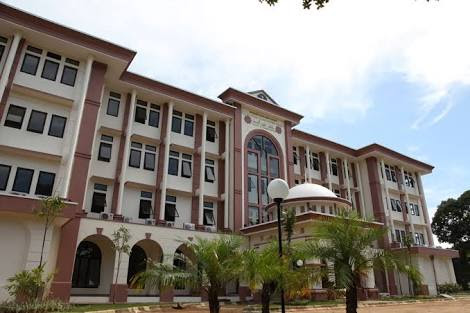THE EFFECT OF FAMILY HARMONY AND SCHOOL ENVIRONMENT ON STUDENTS’ LEARNING OUTCOMES IN MATHEMATICS SUBJECT
Abstract
This study aimed to determine the effect of family harmony and school environment on students learning outcomes in mathematics for grade VII SMP Negeri 2 Tinambung. This research is an ex post facto research, causal-comparative research with a research sample of 70 students selected using probability sampling (proportionate stratified random sampling). The data collection techniques used the family harmony questionnaire, school environment questionnaire, and mathematics learning outcomes test. The data analysis techniques use descriptive and inferential statistical analysis. The results of this study are (1) family harmony has a positive and significant effect on student learning outcomes in mathematics, (2) the school environment has a positive and significant effect on student learning outcomes in mathematics, and (3) family harmony and school environment together have a positive and significant effect on students learning outcomes in mathematics. The recommendation is to create a good school environment to support the learning process. Also, efforts should be made to harmonize families by conducting joint activities with all family members, love each other, create a peaceful home atmosphere, build good and open interaction and communication between family members so that it is possible for children to get a good atmosphere in learning in order to achieve better learning outcomes.Downloads
References
Asrin, Fitria, H., & Eddy, S. (2021). The Effect of teacher competence and the school environment on student achievement of SD Negeri Kecamatan Jirak Jaya. Jurnal Pendidikan Tambusai, 5(3), 5582–5587. Retrieved from https://jptam.org/index.php/jptam/article/view/1754.
Awi, V. M., Mewengkang, N., & Golung, A. (2016). Peranan komunikasi antar pribadi dalam menciptakan harmonisasi keluarga di desa kimaan kabupaten merauke. E-Journal Acta Diurna, 5(2), 1–2. Retrieved from https://ejournal.unsrat.ac.id/index.php/actadiurnakomunikasi/article/view/12210.
Baafi, R. (2020). School physical environment and student academic performance. Advances in Physical Education, 10, 121–137. https://doi.org/10.4236/ape.2020.102012.
Byers, T., Mahat, M., Liu, K., Knock, A., & Imms, W. (2018). Systematic review of the effects of learning environments on student learning outcomes. In Melbourne: University of Melbourne, LEaRN.
Hadi, S., & Novaliyosi. (2019). TIMSS Indonesia (trends in internasional mathematics and science study). Prosiding Seminar Nasional & Call For Papers, 562–569.
Harinarayanan, S., & Pazhanivelu, G. (2018). Impact of school environment on academic achievement of secondary school students at vellore educational district. Shanlax International Journal of Education, 7(1), 13–19. https://doi.org/10.5281/zenodo.2529402.
Jamil, H., & Azra, F. I. (2019). Pengaruh lingkungan keluarga dan motivasi belajar siswa terhadap hasil belajar akuntansi siswa kelas X SMK Negeri 1 Solok selatan. Journal of Economic and Economic Education, 2(2), 85–98. https://doi.org/10.22202economica.2014.v2.i2.221.
Kurniawan, J., Effendi, Z. M., & Dwita, S. (2018). The Effect of school environment, family environment and learning motivation on students’ learning performance. 1st International Conference On Economics Education, Economics, Business and Management, 571–576.
La Kalamu, L. Y. (2018). The effect of the school environment on mathematical learning outcomes in junior high school Gorontalo city state. International Journal of Education, Information Technology, 1(1), 71–78. Retrieved from http://jurnal.peneliti.net/index.php/IJEIT/article/view/46.
Martina. (2019). Pengaruh lingkungan sekolah terhadap hasil belajar siswa pada mata pelajaran pendidikan agama islam di SMPN 9 tulung selapan kabupaten Oki. Jurnal PAI, 1(2). https://doi.org/10.19109/pairf.v1i2.3235.
Muchtar, A. I., Darwis, M., & Muhammad, R. (2013). Pengaruh keharmonisan keluarga dan lingkungan sekolah terhadap prestasi belajar bidang studi sosiologi. Jurnal Analisis, 2(1). Retrieved from http://digilib.unhas.ac.id/opac/detail-opac?id=2787.
Munawaroh. (2017). The influence of teaching methods and learning environment to the student’s learning achievement of craft and entrepreneurship subjects at vocational high school. International Journal of Environmental & Science Education, 12(4). Retrieved from https:// eric.ed.gov/?id=EJ1144859.
Muslih, M. (2021). Correlation of family disharmony with student achievement in islamic education lessons at SMP NUHA Banjarharjo Brebes. Edunesia: Jurnal Ilmiah Pendidikan, 2(3), 581–590. https://doi.org/10.51276/edu.v2i3.168.
Sari, E. (2019). Manajemen lingkungan pendidikan. Jakarta: Uwais Press.
Sitepu, E. (2018). Family harmony to student learning outcomes. IOSR Journal of Humanities and Social Science (IOSR_JHSS), 23(2), 71–75.
Slameto. (2003). Belajar dan faktor-faktor yang mempengaruhinya. Jakarta: Rineka Cipta.
Syarif, I., & Taek, P. D. Y. H. (2020). Dampak keharmonisan keluarga dan pola asuh orang tua terhadap prestasi belajar siswa SDN 113 Pana. Al-Ma’arief: Jurnal Pendidikan Sosial, 2(1), 30–38. https://doi.org/10.35905/almaarief.v2i1.1540.
Tasman, F. (2020). Designing PISA like problems for west sumatra mathematics and science junior high school teachers. Pelita Eksakta, 3(1), 75–81. Retrieved from http://pelitaeksakta.ppj.unp.ac.id/index.php/ pelitaeksakta/article/view/106.
Titin, E. (2014). Keefektifan model problem based learning terhadap hasil belajar keliling dan luas. Journal of Eleentary Education, Jee, 3(1), 40–45. Retrieved from https://journal.unnes.ac.id/sju/index.php/jee/article/view/3651.
Yana, E., & Jayanti, R. P. (2014). Pengaruh lingkungan sekolah dan sikap peserta didik terhadap hasil belajar peserta didik pada mata pelajaran ekonomi. Jurnal Edunomic, 2(2). Retrieved from http://www.fkip-unswagati.ac.id/ejournal/index.php/edunomic/article/view/64.
Yeni, E. M. (2015). Kesulitan belajar matematika di sekolah dasar. Jurnal Jupendas, 2(2), 1–10.
Copyright (c) 2021 Mukmina, Sitti Inaya Masrura, Nurfadilah Mahmud

This work is licensed under a Creative Commons Attribution 4.0 International License.

